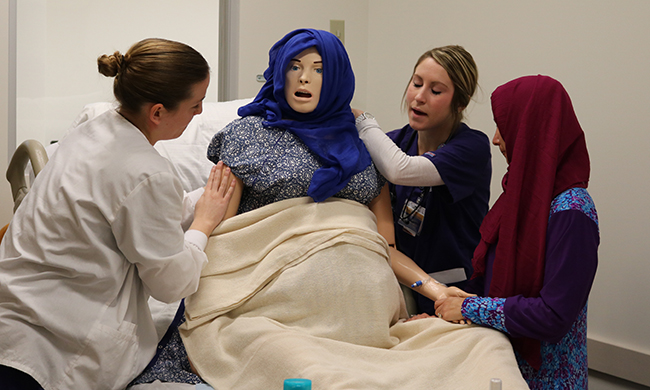Simulation based experiences improve cultural competence
NewsSUMMARY: The School of Nursing has expanded its simulation lab program to include diversity scenarios, enhancing the cultural competence of students through simulated clinical interactions.
By: Caroline Whitlow
Creative Services Student Writer

For years, nursing students have utilized simulation laboratories to practice caring for patients in an environment conducive to learning. The School of Nursing has expanded its simulation lab program to include diversity scenarios, enhancing the cultural competence of students through simulated clinical interactions.
“Simulations have been shown through research to be just as effective as direct clinical time,” said professor Lauren Mullen, who worked to help create the diversity simulations. “Our goal is to provide innovative, dynamic learning experiences for nursing students that give them the opportunity to make mistakes in a safe learning environment.”
The diversity simulations, piloted in 2016 and fully integrated during the spring semester of 2017, focus on four main areas of diversity: language, religious and/or cultural, physical disability and sexual orientation. Lab facilitators present participants with a situation involving these diverse client situations. For example, students might need to work through language barriers or the inability to make healthcare decisions for themselves.
“We focus on the role of the nurse in these situations. Nurses have to understand and apply culturally competent care. For example, if a female patient has a religious difference and can’t have men in the room during certain procedures, it’s the nurse’s job to make sure that request is respected,” said Mullen. “We take on a holistic role when caring for patients and their families.”
Data has shown that inclusion of diversity scenarios positively impacts nursing students’ education and confidence in navigating these situations. Students have given overwhelmingly positive feedback to diversity-based simulations.
“Students say that these simulation experiences really help them,” said Mullen. “These are situations that they might never come across during clinical hours. But because of the simulations, they still have experience with varying needs when they enter their nursing career.”
Mullen hopes that other degree programs will adopt a similar model specific to their discipline.
“Other programs on campus could benefit from creating similar elements. We can talk and read about diversity all we want, but it becomes far more real once we have truly been in those scenarios and felt them,” said Mullen.
For more information, a virtual tour of the simulation labs can be found online.

